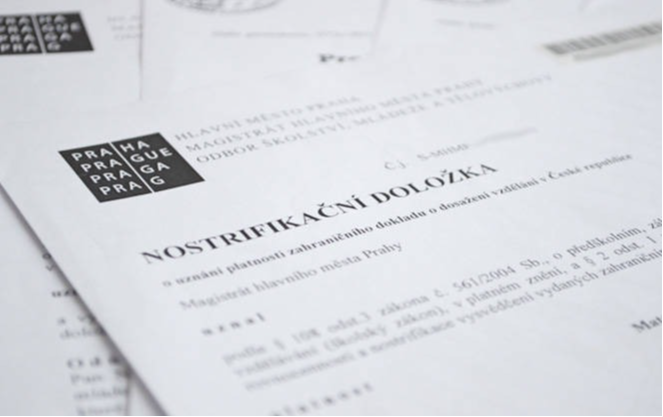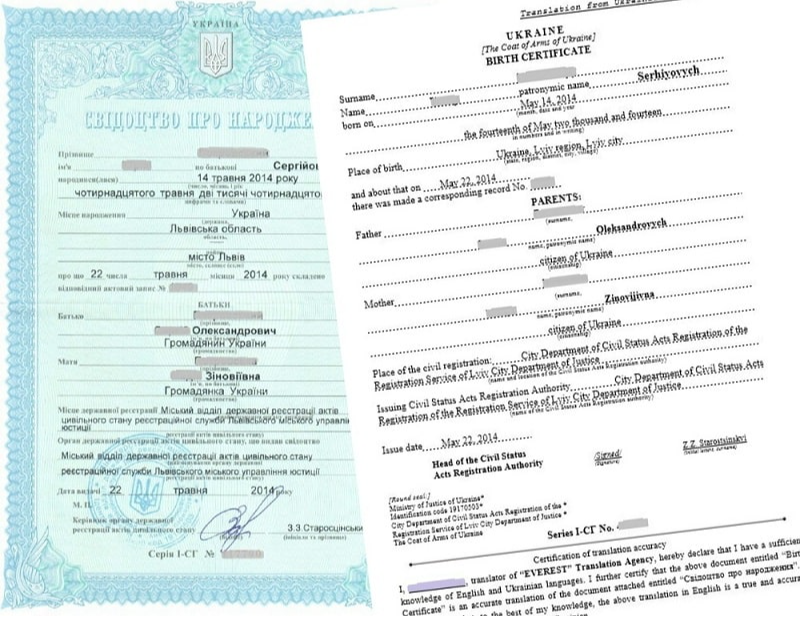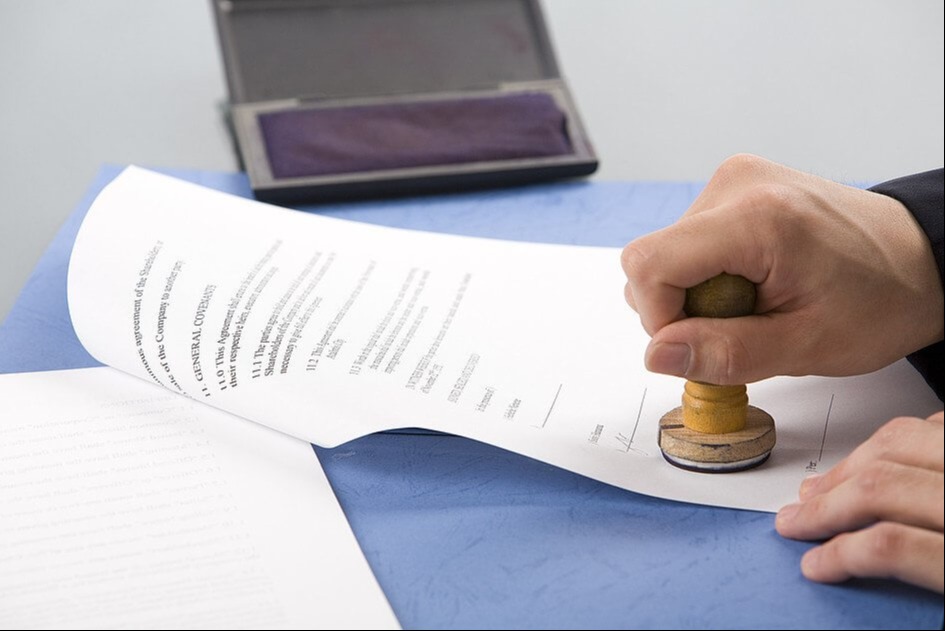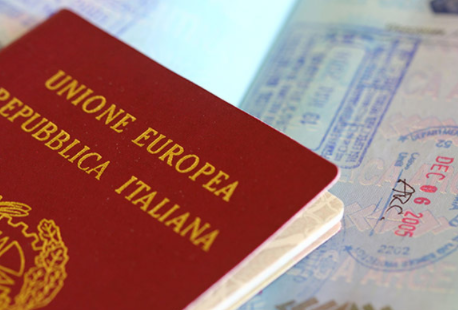Blog

Щоб зробити нострифікацію диплома у Чехії, необхідно підготувати пакет документів (диплом, додаток, переклади чеською мовою, апостиль), подати заяву до відповідного державного органу або університету, сплатити адміністративний збір і дочекатися рішення про визнання освіти. У разі потреби може бути призначено нострифікаційні іспити для підтвердження відповідності навчальної програми чеським стандартам.
Що таке нострифікація
Нострифікація — це офіційна процедура визнання іноземного диплома про освіту на території Чеської Республіки. Вона підтверджує, що отриманий за кордоном документ відповідає чеським освітнім стандартам і дає право власнику користуватися ним на рівних умовах із випускниками чеських навчальних закладів.
Фактично нострифікація означає, що держава визнає еквівалентність вашого диплома чеському зразку. Без цієї процедури іноземний диплом у Чехії не має юридичної сили для працевлаштування, продовження навчання або отримання професійної ліцензії.
Нострифікація диплома для Чехії потрібна абітурієнтам, які планують вступ до чеських університетів, спеціалістам для офіційного працевлаштування, а також тим, хто хоче підтвердити свою кваліфікацію для ведення професійної діяльності в Чехії.
Хто проводить нострифікацію диплома?
Процедура нострифікації в Чехії здійснюється державними освітніми органами та акредитованими навчальними установами, які мають відповідні повноваження.
До органів, що займаються нострифікацією, належать:
- Міністерство освіти, молоді та спорту Чеської Республіки;
- Державні університети та вищі навчальні заклади;
- Крайові управління освіти (для середньої освіти);
- Спеціалізовані установи для медичних і педагогічних спеціальностей.
Конкретний орган залежить від рівня освіти: середня, професійна або вища. Наприклад, диплом бакалавра, магістра чи спеціаліста зазвичай розглядається університетами, а атестати — крайовими управліннями.
Таким чином, нострифікація є централізованою державною процедурою, яка гарантує об’єктивну оцінку вашої освіти.
Процедура нострифікації диплома у Чехії
Процедура нострифікації в Чехії є офіційним адміністративним процесом, який регулюється законодавством Чеської Республіки у сфері освіти. Її мета — перевірити відповідність іноземної освітньої програми чеським стандартам та підтвердити еквівалентність здобутої кваліфікації. Процес може відрізнятися залежно від типу освіти (середня, професійна, вища), спеціальності та країни, де був виданий диплом.
Загалом процедура складається з кількох послідовних етапів:
- Визначення відповідного органу для подання документів залежно від рівня освіти та спеціальності;
- Підготовка пакета документів, включаючи нотаріальні копії, апостиль та офіційний переклад чеською мовою;
- Заповнення та подання заяви на нострифікацію;
- Оплата державного адміністративного збору;
- Формальна перевірка документів на відповідність вимогам;
- Академічна експертиза навчальної програми та кількості годин;
- Прийняття рішення про визнання диплома або призначення нострифікаційних іспитів.
У разі істотних розбіжностей між навчальними програмами заявнику можуть призначити додаткові іспити з профільних дисциплін. Такі іспити проводяться чеською мовою в акредитованих навчальних закладах.
Термін розгляду заяви зазвичай становить від 30 до 90 днів, однак у складних випадках може бути продовжений. Після завершення процедури заявник отримує офіційне рішення, яке має юридичну силу на території Чеської Республіки та дозволяє використовувати диплом для вступу, працевлаштування або професійної діяльності.
Які документи потрібні
Для подання заяви на нострифікацію необхідно підготувати стандартний пакет документів. Всі документи повинні бути перекладені чеською мовою присяжним перекладачем.
Зазвичай потрібні:
- Заява встановленого зразка;
- Копія паспорта або посвідки на проживання;
- Оригінал диплома про освіту;
- Додаток до диплома з переліком предметів і годин;
- Нотаріально завірені копії документів;
- Апостиль або легалізація (за потреби);
- Офіційний переклад чеською мовою;
- Квитанція про оплату адміністративного збору.
Для медичних, педагогічних та технічних спеціальностей можуть вимагатися додаткові документи або підтвердження практики.
Правильно підготовлений пакет документів значно прискорює процедуру та зменшує ризик відмови.
Що робити, якщо диплом не прийняли?
У разі відмови в нострифікації не варто панікувати — це не означає, що шлях до визнання освіти закритий.
Можливі подальші дії:
- Подати апеляцію на рішення протягом встановленого терміну;
- Доздати нострифікаційні іспити з профільних предметів;
- Надати додаткові підтверджуючі документи;
- Подати повторну заяву до іншого університету;
- Пройти програму доповнення освіти в Чехії.
Часто відмова пов’язана з різницею в навчальних програмах або недостатньою кількістю академічних годин. У такому випадку складання іспитів дозволяє компенсувати ці відмінності.
Головне — правильно проаналізувати причину відмови та обрати оптимальну стратегію подальших дій.
Нострифікація диплома в Чехії — це обов’язковий крок для тих, хто планує навчатися, працювати або будувати кар’єру в цій країні. Вона підтверджує вашу кваліфікацію на державному рівні та відкриває доступ до чеського ринку праці й освіти.
Хоча процедура потребує часу та підготовки, правильний підхід і грамотно зібрані документи значно підвищують шанси на успішне рішення. Завчасне планування, консультації зі спеціалістами та уважне дотримання вимог допоможуть пройти нострифікацію без зайвих труднощів і зробити перший впевнений крок до життя та кар’єри в Чехії.

Переклад документів на німецьку мову — це професійна послуга, яку надають бюро перекладів або незалежні перекладачі. Вона передбачає точний переклад тексту та, за потреби, його офіційне засвідчення (печаткою бюро, нотаріальним підписом або апостилем) для надання документу юридичної сили. Зазвичай процес починається з надсилання скану або фото документа, після чого виконується розрахунок вартості та підготовка готового перекладу у зручному форматі. Водночас онлайн-перекладачі на кшталт Google Translate можуть забезпечити швидкий переклад для ознайомлення, але не підходять для офіційного використання.
Переклад документів на німецьку мову є важливою складовою міжнародної комунікації у сфері освіти, бізнесу, працевлаштування, міграції та юридичних процедур. Німеччина, Австрія та Швейцарія мають суворі вимоги до оформлення документів, тому якісний та коректний переклад є запорукою успішного розгляду ваших паперів у державних і приватних установах.
Коли потрібен переклад на німецьку мову?
Переклад на німецьку мову — це процес точного відтворення змісту документа з дотриманням юридичних, мовних та стилістичних норм країни призначення. Такий переклад може бути інформаційним або офіційним (завіреним), залежно від мети використання документа.
Найчастіше переклад на німецьку мову потрібен у таких випадках:
- Подання документів до університетів Німеччини, Австрії або Швейцарії;
- Оформлення робочої візи або дозволу на проживання;
- Укладення контрактів із німецькими компаніями;
- Реєстрація бізнесу або відкриття рахунку в банку;
- Участь у судових або нотаріальних процедурах;
- Підтвердження освіти та кваліфікації;
- Возз’єднання сім’ї.
Важливо розуміти, що навіть незначна помилка у перекладі може призвести до відмови у прийнятті документів. Саме тому переклад має бути не лише грамотним, а й відповідати офіційним вимогам країни.
Типи перекладів на німецьку мову
Існує кілька основних типів перекладів, які відрізняються за призначенням, форматом і юридичною силою. Вибір залежить від того, куди саме подається документ.
Основні типи перекладів:
- Письмовий переклад — стандартний переклад текстів, довідок, сертифікатів, анкет, листів.
- Офіційний (завірений) переклад — переклад, який має юридичну силу та приймається державними установами.
- Нотаріально завірений переклад — переклад, підпис перекладача на якому засвідчує нотаріус.
- Судовий переклад — виконується присяжним перекладачем для судових органів.
- Технічний переклад — інструкції, специфікації, технічна документація.
- Медичний переклад — довідки, епікризи, результати аналізів.
- Юридичний переклад — договори, статути, довіреності, судові рішення.
Кожен тип перекладу має свої особливості оформлення та термінології. Наприклад, юридичні та медичні документи потребують максимальної точності, адже навіть одна неправильна формулювання може змінити юридичний сенс документа.
Хто може виконати офіційний переклад документів на німецьку мову?
Офіційний переклад — це переклад, який має юридичну силу та приймається державними органами, навчальними закладами та роботодавцями. Не кожен перекладач має право виконувати такі переклади.
Офіційний переклад можуть виконувати:
- Присяжні перекладачі — фахівці, які отримали державну акредитацію в Німеччині, Австрії або Швейцарії.
- Сертифіковані перекладачі — перекладачі з профільною освітою та відповідними сертифікатами.
- Бюро перекладів — компанії, які надають комплексні послуги з перекладу та завірення документів.
- Перекладачі з нотаріальним завіренням — коли переклад засвідчується підписом нотаріуса.
Вибір виконавця залежить від вимог установи, куди подаються документи. У деяких випадках приймається лише переклад від присяжного перекладача, внесеного до офіційного реєстру.
Вимоги до перекладу
Документи, які подаються до німецьких установ, повинні відповідати чітким формальним і мовним стандартам. Недотримання вимог може призвести до відмови у прийнятті пакету документів.
Основні вимоги до перекладу:
- Повна відповідність оригіналу без скорочень і додавань;
- Збереження структури документа (таблиці, печатки, підписи);
- Коректна передача імен, назв і дат;
- Використання офіційної термінології;
- Відсутність орфографічних і граматичних помилок;
- Правильне оформлення реквізитів перекладача;
- Наявність підпису та печатки (для завіреного перекладу).
Особливу увагу приділяють транслітерації імен та назв відповідно до міжнародних стандартів. Також важливо, щоб переклад виглядав як єдиний документ з оригіналом і містив примітки щодо нерозбірливих печаток або пошкоджених фрагментів.
Переклад документів на німецьку мову — це не просто мовна послуга, а важливий юридичний інструмент для навчання, роботи, бізнесу та імміграції. Якісний переклад забезпечує правильне сприйняття інформації, відповідність вимогам німецьких установ і значно підвищує шанси на успішний розгляд документів. Обираючи професійного перекладача або бюро перекладів, ви інвестуєте у свою репутацію, час і спокій, отримуючи гарантію точності та юридичної коректності кожного документа.

Присяжний переклад у ЄС — це офіційний переклад документів, виконаний акредитованим перекладачем, який дав присягу та несе повну відповідальність за точність перекладу. Такий переклад завіряється печаткою і підписом перекладача, що надає йому юридичну силу для використання в судах, державних установах, консульствах, а також для освітніх, трудових або імміграційних процедур. На відміну від звичайного нотаріально засвідченого перекладу, де підтверджується лише підпис нотаріуса, присяжний переклад гарантує точність і відповідність оригіналу.
Що таке присяжний переклад?
Присяжний переклад — це офіційний переклад документа, який має юридичну силу та підтверджується печаткою або підписом перекладача, який пройшов акредитацію. Такий переклад визнається державними органами, судами, нотаріусами та іншими офіційними установами як достовірна версія оригіналу.
У Європейському Союзі присяжний переклад часто називають “sworn translation” або “certified translation”, і він регулюється національним законодавством кожної країни-члена. Основна мета присяжного перекладу — забезпечити, щоб зміст документа був переданий точно, без змін та пропусків, з юридичною відповідальністю перекладача за достовірність перекладу.
Важливо розуміти, що не всі документи потребують присяжного перекладу. Часто достатньо звичайного перекладу для особистих потреб або внутрішніх комунікацій. Однак при подачі документів у державні органи, суди, університети або для оформлення юридичних угод присяжний переклад стає обов’язковим.
Для яких документів потрібен присяжний переклад?
Присяжний переклад застосовується до документів, які мають юридичну або офіційну силу. Це гарантує, що перекладений документ буде прийнятий у будь-якій країні ЄС без сумнівів щодо його достовірності.
Типові документи, що потребують присяжного перекладу:
- Свідоцтва про народження, шлюб або смерть;
- Дипломи та додатки до них;
- Судові рішення та юридичні документи;
- Договори та контракти, нотаріально завірені документи;
- Ліцензії, сертифікати та дозволи;
- Паспортні документи та посвідчення особи;
- Медичні довідки, які подаються у державні органи.
Наявність присяжного перекладу для таких документів забезпечує їхню легітимність та прийняття у будь-якому офіційному процесі. Навіть якщо країна ЄС визнає документи іншої держави, без присяжного перекладу їх можуть не прийняти, що може затримати або ускладнити процедури.
Особливості присяжного перекладу в ЄС
Присяжний переклад у Європейському Союзі має ряд специфічних особливостей, пов’язаних з правовими вимогами, стандартами та практикою перекладу.
До основних особливостей можна віднести:
- Юридична відповідальність перекладача — перекладач відповідає за точність перекладу і може бути притягнутий до відповідальності у разі неточностей або помилок.
- Акредитація перекладача — у більшості країн ЄС переклад має здійснюватися тільки акредитованими або присяжними перекладачами, внесеними до офіційного реєстру.
- Фіксовані вимоги до форми документа — переклад має містити підпис та печатку перекладача, іноді додається декларація про точність перекладу.
- Мовні та правові нюанси — перекладач повинен враховувати юридичну термінологію та вимоги конкретної країни ЄС.
- Визнання перекладу у всіх органах ЄС — при правильному оформленні присяжний переклад визнається державними установами, банками, університетами та судовими органами.
Завдяки цим особливостям присяжний переклад стає надійним інструментом для легального обігу документів у ЄС. Він гарантує, що офіційні органи приймуть документ без додаткових перевірок та сумнівів щодо його достовірності.
Етапи та вимоги присяжного перекладу для ЄС
Процес присяжного перекладу має певну стандартизовану структуру, що дозволяє уникнути помилок та забезпечує юридичну силу документа.
Основні етапи присяжного перекладу:
- Оцінка документа — перевірка оригіналу, визначення його типу та потреби у присяжному перекладі.
- Підбір перекладача — обрання акредитованого або присяжного перекладача, який має досвід роботи з юридичними документами та мовними нюансами конкретної країни
- Безпосередній переклад — точне відтворення змісту документа, включаючи всі юридичні терміни та специфічні формулювання
- Нотаріальне або присяжне завірення — додавання печатки та підпису перекладача, іноді разом із декларацією про достовірність
- Перевірка та верифікація — переклад проходить контроль точності та відповідності оригіналу перед передачею замовнику.
- Передача готового документа — клієнт отримує переклад у встановленій формі для подачі до державних органів або інших офіційних структур.
Дотримання цих етапів забезпечує легітимність перекладу та його повне визнання у країнах ЄС.
Присяжний переклад у Європейському Союзі — це не просто переклад тексту, а юридично значущий процес, що гарантує достовірність та прийнятність документів у будь-яких офіційних органах. Його використання необхідне для важливих юридичних, освітніх та адміністративних документів.
Завдяки чіткому дотриманню вимог, вибору акредитованого перекладача та правильному оформленню, присяжний переклад дозволяє уникнути проблем з подачею документів, економить час та забезпечує спокій для осіб, які працюють з документами на території ЄС.
Для тих, хто планує подавати документи у різні країни Євросоюзу, присяжний переклад стає обов’язковим кроком для легального та швидкого оформлення усіх процедур.

Переклад для юридичних осіб — це спеціалізована послуга з перекладу правових документів, яка потребує від перекладача глибоких знань у сфері права та юридичної термінології. Такі переклади зазвичай виконують фахівці з подвійною освітою — філологічною та юридичною — що гарантує точність формулювань і відповідність чинному законодавству. За необхідності переклад може бути нотаріально засвідчений, апостильований або завірений печаткою бюро для офіційного використання.
Що таке переклад для юридичних осіб?
Переклад для юридичних осіб — це професійний письмовий переклад документів, матеріалів та ділової кореспонденції, які використовуються компаніями, організаціями, підприємствами та установами у своїй господарській, правовій та міжнародній діяльності. Такий переклад має не лише точно передавати зміст, а й відповідати юридичним нормам, термінологічним стандартам і вимогам офіційного документообігу.
На відміну від звичайного перекладу, переклад для юридичних осіб передбачає роботу з документами, що мають правову силу: договорами, статутами, фінансовими звітами, сертифікатами, ліцензіями, тендерною документацією, судовими рішеннями тощо. Будь-яка неточність або помилка може призвести до фінансових втрат, відмови в реєстрації, проблем із контролюючими органами або навіть судових спорів.
Юридичний переклад вимагає глибокого розуміння не лише мови, а й правових систем різних країн, адже багато юридичних термінів не мають прямого аналога в інших мовах. Саме тому переклад для юридичних осіб виконують спеціалізовані перекладачі, які працюють у тісній співпраці з юристами та знають особливості міжнародного ділового середовища.
Таким чином, переклад для юридичних осіб — це комплексна послуга, спрямована на забезпечення повної юридичної коректності, точності формулювань та відповідності міжнародним стандартам документообігу.
Коли потрібен переклад для юридичних осіб?
Сучасний бізнес дедалі частіше виходить за межі внутрішнього ринку, співпрацює з іноземними партнерами, інвесторами та клієнтами. У таких умовах переклад документів стає обов’язковою складовою будь-якої міжнародної діяльності.
Переклад для юридичних осіб потрібен у таких випадках:
- Укладання міжнародних контрактів і договорів;
- Реєстрація компанії за кордоном або відкриття філії;
- Участь у міжнародних тендерах і грантових програмах;
- Подання фінансової звітності іноземним партнерам чи інвесторам;
- Сертифікація продукції для експорту;
- Відкриття рахунків у закордонних банках;
- Оформлення ліцензій та дозволів;
- Участь у судових процесах за кордоном;
- Співпраця з міжнародними логістичними та страховими компаніями;
- Підготовка корпоративних документів для іноземних регуляторів.
У більшості таких ситуацій переклад має бути не лише професійним, а й нотаріально засвідченим або апостильованим, щоб мати юридичну силу за кордоном.
Отже, переклад для юридичних осіб — це необхідний інструмент для легального, безпечного та ефективного ведення міжнародного бізнесу, який допомагає уникнути ризиків і забезпечує прозорість ділових відносин.
Ключові особливості юридичного перекладу
Юридичний переклад має низку специфічних особливостей, які відрізняють його від технічного, медичного чи художнього перекладу. Його головна мета — зберегти юридичну силу документа та гарантувати однозначне трактування кожного формулювання.
Основні особливості юридичного перекладу:
- Використання вузькоспеціалізованої правової термінології;
- Точне відтворення структури документа;
- Збереження нумерації, посилань та реквізитів;
- Адаптація термінів відповідно до правових систем різних країн;
- Відсутність вільних інтерпретацій та стилістичних відступів;
- Дотримання офіційно-ділового стилю;
- Перевірка відповідності оригіналу та перекладу;
- Можливість нотаріального засвідчення.
Юридичні документи часто містять складні конструкції, багаторівневі формулювання та правові застереження. Саме тому перекладач повинен не лише володіти мовою, а й розуміти логіку правових процесів та наслідки кожного формулювання.
У результаті якісний юридичний переклад гарантує, що документ буде прийнятий іноземними партнерами, банками, державними органами та судами без додаткових правок чи уточнень.
Етапи та вимоги юридичного перекладу
Процес перекладу для юридичних осіб складається з кількох обов’язкових етапів, кожен з яких спрямований на забезпечення максимальної точності та юридичної коректності документа.
Основні етапи юридичного перекладу:
- Аналіз документа та визначення його правового контексту;
- Підбір профільного перекладача з відповідною спеціалізацією;
- Створення термінологічної бази для проєкту;
- Безпосередній переклад документа;
- Редакторська та юридична вичитка;
- Перевірка форматування та відповідності оригіналу;
- За потреби — нотаріальне засвідчення;
- Підготовка фінальної версії для подання.
До юридичного перекладу висуваються особливі вимоги:
- Абсолютна точність формулювань;
- Повна відповідність оригіналу;
- Дотримання юридичної стилістики;
- Конфіденційність інформації;
- Відповідність міжнародним стандартам документообігу.
Крім того, юридичні документи часто потребують перекладу в стислі терміни, особливо коли йдеться про тендери, переговори чи угоди. Тому професійні бюро перекладів працюють за чітко налагодженими процесами, які дозволяють гарантувати якість навіть при термінових замовленнях.
Таким чином, юридичний переклад — це складний багаторівневий процес, у якому важлива кожна деталь.
Переклад для юридичних осіб — це не просто мовна послуга, а стратегічний інструмент для розвитку бізнесу, міжнародного партнерства та правового захисту компанії. Він забезпечує прозорість угод, довіру іноземних контрагентів і відповідність міжнародним стандартам. Обираючи професійний юридичний переклад, компанія інвестує у власну репутацію, безпеку та стабільність на глобальному ринку.

Переклад документів для суду — це юридично значущий процес, що вимагає високої точності та офіційного засвідчення, зазвичай через нотаріуса, який підтверджує підпис дипломованого перекладача, що знається на юриспруденції. Це стосується позовів, апеляцій, судових рішень та доказів, складених іноземною мовою, і є обов'язковим для їх прийняття судом, іноді з додаванням апостиля для використання за кордоном. Важливо залучати досвідчених перекладачів та дотримуватися вимог щодо легалізації, щоб переклад мав юридичну силу.
Переклад документів для судового засідання, це не просто перехід з однієї мови на іншу, це відповідальна процедура, яка впливає на результат судового розгляду та законність поданих матеріалів. Якість перекладу має забезпечувати точність змісту, дотримання юридичної термінології та відповідність вимогам судів різних юрисдикцій. У цій статті розглянемо, що означає переклад документів для суду, які вимоги до нього висуваються, які документи зазвичай потребують перекладу, з якими складнощами стикаються виконавці та замовники, і дамо практичні поради, як обрати надійного перекладача та уникнути типових помилок.
Що означає переклад документів для суду?
Переклад документів для суду — це спеціалізований процес перенесення змісту з однієї мови на іншу з суворим дотриманням контексту, юридичної точності та формального оформлення. Такий переклад повинен зберегти не лише семантику, але й стиль, структуру та зміст документів:
- Заяв;
- Доказів;
- Договорів;
- Протоколів тощо.
Важливо, щоб переклад був офіційно засвідчений або апостильований за вимогами конкретної юрисдикції. Якість перекладу може впливати на швидкість судового розгляду, правильність застосування законодавчих норм та, зрештою, на рішення суду.
Вимоги до перекладу документів для суду
У більшості судових процедур існують спільні вимоги до якості та форми перекладу.
- По-перше, це точність і повнота: кожне слово має відображати зміст оригіналу, без домислів або пропусків.
- По-друге, використання юридичної термінології: терміни повинні відповідати законодавству країни подання та узгоджуватися з існуючими глосаріями.
- По-третє, структурна відповідність: збереження назви документу, реквізитів, дат, підписів — для зручності перевірки та легітимності. Також важливі грамотність та стиль — нейтральний, без двозначностей.
Засвідчення та легалізація можуть бути обов’язковими:
- Нотаріальне засвідчення, апостиль або консульська легалізація залежно від вимог країни. Крім того, часто потрібна прозорість подачі — паралельний дубльований варіант або вклеювання перекладу в текст документу.
- Не менш важлива конфіденційність: дотримання норм захисту даних та безпеки інформації.
- І, нарешті, дотримання термінів: судові дедлайни можуть вимагати оперативної підготовки перекладу та його легалізації.
Які документи потребують перекладу для суду?
Зазвичай список охоплює різні групи документів.
- По-перше, особисті документи: паспорт, свідоцтво про народження, свідоцтво про шлюб або розлучення, довідка з місця проживання.
- По-друге, докази та контракти: договори купівлі-продажу, позики, трудові договори, страхові полісі.
- По-третє, судові документи: позови, відповіді, протоколи слухань, рішення та ухвали. По-четверте, довідки та виписки: банківські виписки, медичні висновки, виписки з реєстрів, нотаріальні акти.
І, нарешті, інші документи, які мають значення для справи — навчальні документи, сертифікати, ліцензії та технічна документація.
Які складнощі має переклад документів для суду?
Головні труднощі пов’язані з юридичними нюансами та різницею правових систем. Юридична багатозначність термінів може призвести до неправильного тлумачення, якщо контекст не враховується. Різні країни мають різні стандарти оформлення документів, що вимагає адаптації перекладу, а не дослівного переносу. Також існують питання засвідчення та легалізації: апостиль, консульська легалізація або нотаріальне засвідчення можуть потребувати значного часу. Обсяг документів може бути великим, що ставить задачу збереження цілісності та структури під час перекладу. Конфіденційність та захист персональних даних — критично важливі аспекти, особливо коли мова йде про медичні дані, фінансову інформацію та ін. І, звісно, строкові обмеження: погоджені дедлайни вимушують працювати швидко, але без компромісів щодо якості.
Корисні поради для замовників перекладу для суду
- Вибирайте сертифікованого перекладача: перевіряйте наявність ліцензії або сертифіката, досвід у юридичному перекладі та знання відповідної термінології.
- Замовляйте частинами з попереднім переглядом: за можливістю отримайте попередній варіант перекладу для погодження з правовими експертами.
- Узгоджуйте формат заздалегідь: дізнайтесь вимоги суду щодо формату, підписів, печаток та засвідчення.
- Перевіряйте точність: порівнюйте переклад з оригіналом, звертайте увагу на нумерацію, дати та власні назви.
- Плануйте часові рамки: врахуйте додатковий час на легалізацію та апостиль, щоб уникнути затримок у судовому розгляді.
Завершення Переклад документів для суду — це відповідальна комбінація мовної точності, правової грамотності та дотримання формальностей. Вибір компетентного перекладача, розуміння вимог суду та чітке дотримання процедур значно підвищують шанси на коректне та оперативне розглядання справи. Використайте запропоновані поради, щоб мінімізувати ризики та забезпечити, що ваші документи будуть прийняті без зайвих затримок.

Для подачі документів на громадянство необхідно звернутися до професійного перекладача та оформити нотаріальне засвідчення перекладу або підтвердження печаткою бюро перекладів. Переклад виконується українською мовою відповідно до встановлених вимог. Вартість послуги залежить від мовної пари та складності тексту й зазвичай стартує від 250 грн за одну сторінку. Строки виконання перекладу — від одного робочого дня. Також важливо заздалегідь уточнити вимоги органу, який розглядає документи (ДМС), оскільки в окремих випадках може знадобитися апостиль.
Що означає переклад документів для громадянства?
Переклад документів для громадянства — це обов’язкова процедура офіційного перекладу особистих, юридичних та ідентифікаційних документів на мову країни, громадянство якої ви плануєте отримати. У більшості випадків переклад повинен бути виконаний професійним перекладачем і нотаріально завірений, щоб мати юридичну силу.
Органи міграційної служби, консульства та імміграційні відомства приймають документи виключно державною мовою країни або однією з офіційно дозволених мов. Саме тому якісний переклад є ключовим етапом у процедурі оформлення громадянства.
Помилки, неточності або неправильне оформлення перекладу можуть призвести до відмови в прийомі документів або суттєвого затягування розгляду справи. Тому переклад документів для громадянства повинен відповідати всім вимогам міграційного законодавства конкретної держави.
Коли необхідний переклад документів для громадянства?
Переклад документів необхідний у всіх випадках, коли ви подаєте документи іноземною мовою. Це стосується:
- Подачі заяви на отримання громадянства;
- Оформлення постійного місця проживання (ПМП);
- Подачі документів на тимчасовий або постійний дозвіл на проживання;
- Возз’єднання сім’ї;
- Подачі документів через консульство або міграційну службу.
Якщо документи складені українською або російською мовою, а подача здійснюється, наприклад, у Польщі, Німеччині, Іспанії чи Канаді, переклад на відповідну державну мову є обов’язковим.
У більшості країн приймаються лише нотаріально завірені переклади або переклади, виконані присяжними перекладачами. Вимоги можуть відрізнятися залежно від держави, але загальний принцип залишається незмінним — без офіційного перекладу документи не мають юридичної сили.
Які документи потрібно перекладати для подачі на громадянство?
Перелік документів залежить від країни та підстав отримання громадянства, однак найчастіше перекладу підлягають:
- Паспорт громадянина;
- Закордонний паспорт;
- Свідоцтво про народження;
- Свідоцтво про шлюб або розлучення;
- Довідка про несудимість;
- Довідка про місце проживання;
- Документи про освіту;
- Трудова книжка або довідки з місця роботи;
- Податкові та фінансові довідки;
- Рішення судів (за необхідності);
- Документи про зміну прізвища або імені.
Важливо, щоб переклад повністю відповідав оригіналу, включно з печатками, штампами, підписами та іншими реквізитами. Усі дати, імена, адреси та номери документів повинні бути передані без помилок.
Неправильне написання імені або прізвища може спричинити серйозні проблеми під час перевірки документів, тому професійний переклад — це не формальність, а необхідність.
Як підготувати документи до перекладу?
Перед тим як замовити переклад документів для громадянства, необхідно правильно підготувати пакет документів:
- Перевірте актуальність документів - багато довідок мають обмежений термін дії (наприклад, довідка про несудимість або довідка про доходи).
- Зробіть якісні копії або скани - документи повинні бути чіткими, без затемнень і обрізаних полів. Усі печатки та підписи мають добре читатися.
- Перевірте правильність даних - якщо в документах є помилки або розбіжності, їх варто виправити до початку перекладу.
- Уточніть вимоги країни - деякі держави вимагають переклад лише присяжним перекладачем або обов’язкове апостилювання.
- Замовляйте переклад у спеціалізованому бюро - професійні бюро перекладів знають міграційні вимоги та гарантують юридичну коректність перекладу.
Якісний переклад документів для громадянства — це важливий крок до легального статусу в іншій країні. Правильна підготовка документів і професійний підхід допоможуть уникнути затримок, відмов і додаткових витрат.
Would you like to order translation of a document or another service?
